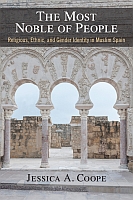The Most Noble of People
External Review of Whole Manuscript
Religious, Ethnic, and Gender Identity in Muslim Spain
Author(s)
Coope, Jessica A.
Collection
Knowledge Unlatched (KU)Number
5122Language
EnglishAbstract
The Most Noble of People presents a nuanced look at questions of identity in Muslim Spain under the Umayyads, an Arab dynasty that ruled from 756 to 1031. With a social historical emphasis on relations among different religious and ethnic groups, and between men and women, Jessica A. Coope considers the ways in which personal and cultural identity in al-Andalus could be alternately fluid and contentious.
The opening chapters define Arab and Muslim identity as those categories were understood in Muslim Spain, highlighting the unique aspects of this society as well as its similarities with other parts of the medieval Islamic world. The book goes on to discuss what it meant to be a Jew or Christian in Spain under Islamic rule, and the degree to which non-Muslims were full participants in society. Following this is a consideration of gender identity as defined by Islamic law and by less normative sources like literature and mystical texts. It concludes by focusing on internal rebellions against the government of Muslim Spain, particularly the conflicts between Muslims who were ethnically Arab and those who were Berber or native Iberian, pointing to the limits of Muslim solidarity.
Drawn from an unusually broad array of sources—including legal texts, religious polemic, chronicles, mystical texts, prose literature, and poetry, in both Arabic and Latin—many of Coope’s illustrations of life in al-Andalus also reflect something of the larger medieval world. Further, some key questions about gender, ethnicity, and religious identity that concerned people in Muslim Spain—for example, women’s status under Islamic law, or what it means to be a Muslim in different contexts and societies around the world—remain relevant today.
Keywords
Biography & AutobiographyDOI
https://doi.org/10.3998/mpub.9297351ISBN
9780472902583Publisher
University of Michigan PressPublisher website
https://www.press.umich.edu/Publication date and place
2017Grantor
Imprint
University of Michigan PressClassification
Biography: general


 Download
Download